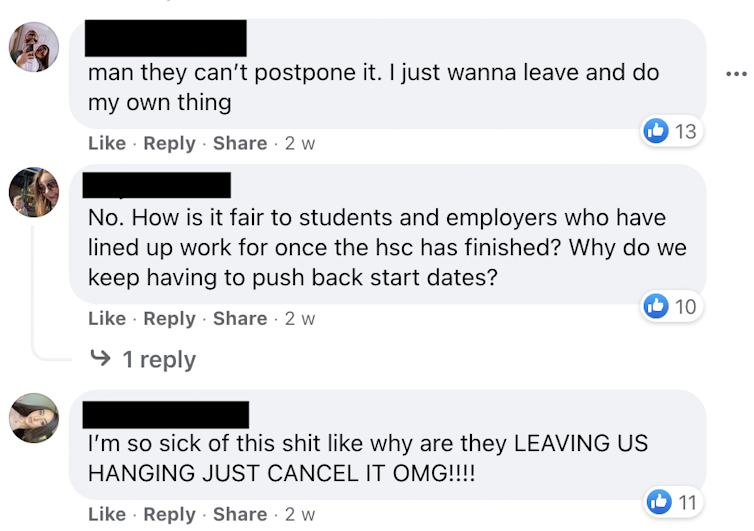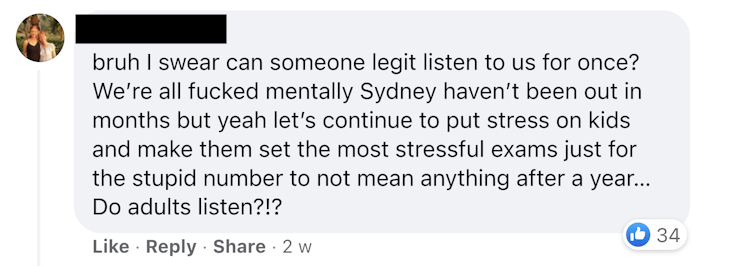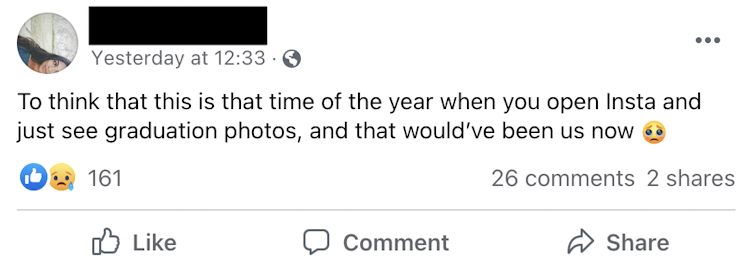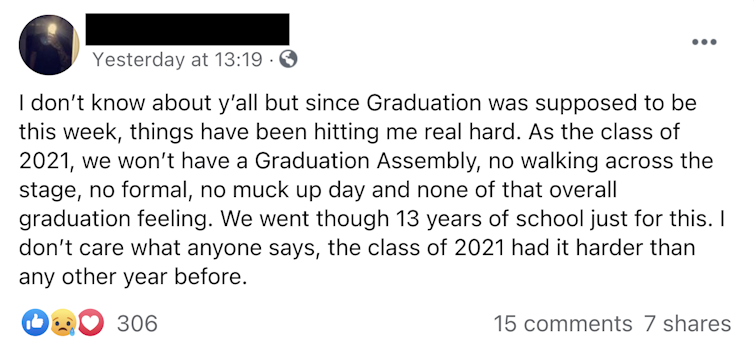Source: The Conversation (Au and NZ) – By Caroline Hunt, Professor of Clinical Psychology, University of Sydney

In August this year, the Journal of the American Medical Association (JAMA) published research charting the impact of the pandemic on the mental health of young people. In the first year of the pandemic, one in four young people worldwide was experiencing depression, while one in five was experiencing anxiety.
Alarmingly, the research concluded these elevated mental health concerns were double pre-pandemic estimates and increasing over time.
At the end of August, the New South Wales Education Department handed its struggling senior school students several extra weeks to study for the Higher School Certificate (HSC) exams — delayed until November.
The Universities Admissions Centre, which processes undergraduate course applications for universities mainly located in NSW and the ACT, assured students they would still receive an ATAR and university offers despite the delay. The release of the ATAR is scheduled for January 2022 and the release of offers based on ATAR in January and February 2022.
In stressful environments, people can find comfort in having a finish line. The NSW announcement lacked the detail needed to quell many anxieties in young people. To use sporting parlance, students who had prepared for a long-expected 5km run felt they were now running a marathon.
Read more:
Fears loom for teens undergoing vital brain development during COVID. Telling stories might help
What the class of 2021 is saying
The afternoon when the delayed HSC plans were announced, a year 12 person told me there was an overwhelming sense of despair among her peers.
She pointed me to a group on Facebook where many are sharing their frustrations and offering each other support. The HSC Discussion Group 2021 has more than 39,000 members.
After the announcement the exams would be delayed, many were shocked they were still going ahead. Others were upset at the delay itself, wanting to have the year over and done with.

Facebook screenshot
One student wrote:
[…] can someone legit listen to us for once? We’re all fucked mentally Sydney haven’t been out in months but yeah let’s continue to put stress on kids and make them set [sic] the most stressful exams just for the student number to not mean anything after a year […] Do adults listen?!?
Another wrote:
well there goes all my motivation, graduation a formal haha what a joke. was meant to be graduating in september and finishing my exams in october before covid came and ruined it.

Facebook screenshot

Facebook screenshot
A study of Australian final-year high school students before the pandemic indicated alarmingly high levels of depression, anxiety and stress, especially among students who felt lonely and disconnected from their friends.
While there is no research specific to final-year students in Australia, overseas studies show existing mental health problems have increased for this group of students during COVID. This is especially during lockdowns, which required online learning and disruptions to the usual events that mark the end of high school.
Australian students are feeling the effects of missing school events, especially milestones like graduation.
On September 13, one student posted in the HSC discussion group:
To think that this is that time of the year when you open Insta and just see graduation photos, and that would’ve been us now.
Another wrote:
I don’t know about y’all but since Graduation was supposed to be this week, things have been hitting me real hard. As the class of 2021, we won’t have a Graduation Assembly, no walking across the stage, no formal, no muck up day and none of that overall graduation feeling. We went through 13 years of school just for this. I don’t care what anyone says, the class of 2021 had it harder than any other year before.

Facebook screenshot

Facebook screenshot
What states need to do
NSW and Victoria have announced initiatives to provide additional youth mental health services. NSW is spending A$109.5 million over four years to develop 25 “Safeguards” — child and adolescent mental health response teams to provide services to children and teenagers with moderate to severe mental health issues. Victoria has announced more than $13 million for establishing 20 pop-up mental health centres across Melbourne and regional Victoria, with 90 dedicated clinicians.
These services, if properly staffed and structured, can be positive models of care to address the enormous demand in the community. However, this will all come many months too late to support the class of 2021.
So, what could we do to have an immediate impact? Fast-tracked services delivering care almost immediately can be implemented through existing low-cost services, such as Headspace. Effective care must include mental health experts such as clinical psychologists providing leadership to teams of mental health staff including trainees, registrars and registered psychologists.
Clinical psychology postgraduate students undertaking placements can boost numbers quickly to expand access to an expert workforce for youth across the country. Each year in NSW alone, over 300 clinical psychology students undertake six-month-long placements mostly in public mental health services, and there is capacity for many to be working in Headspace centres to provide psychological interventions to youth in need. All we need here is government funding for supervisors.
Under such a model the structures to ensure community safety, such as supervision in accredited placements, are already in place.
Read more:
‘It really sucks’: how some Year 12 students in Queensland feel about 2020
Headspace is also highly accessible. An internal report into the reach of our local Headspace I undertook with a University of Sydney student showed the service was accessed by a significant proportion of youth from disadvantaged groups, including Aboriginal youth, LGBTQI youth and youth from diverse cultural backgrounds.
We know most private psychologists are booked out and public resources were scant even before the pandemic began.
Given the emerging mental health crisis in the class of 2021, governments need to act quickly to provide access to psychology services. Once we have emerged from the crisis of this pandemic, we all need to look seriously at how we equip our mental health workforce for the long term.
If this article has raised issues for you, or if you’re concerned about someone you know, call Lifeline on 13 11 14 or Kids Helpline on 1800 55 1800.
![]()
Caroline Hunt receives funding from the NHMRC. She is affiliated with the Australian Clinical Psychology Association and the University of Sydney.
– ref. Delayed graduations, no formals — the class of 2021 has had a hell of a year. They need mental health support, and quickly – https://theconversation.com/delayed-graduations-no-formals-the-class-of-2021-has-had-a-hell-of-a-year-they-need-mental-health-support-and-quickly-167187




